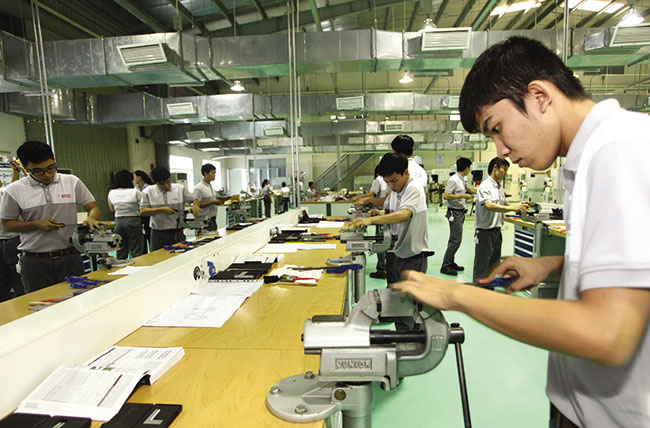Roadmap built to curb carbon emissions

Sustainable production is a key to minimise emissions -Photo: Le Toan
In recent years, Vietnam has been actively encouraging a green economy in which Sustainable Consumption and Production (SCP) is a key factor to minimise greenhouse gas emissions and facilitate the formation of a low-carbon economy.
Local enterprises, however, still rely heavily on a high level of input materials and energy, the inappropriate and uneconomical use of resources, and outdated processes and technology, leading to a high rate of emissions and the overall unsustainable development of industry.
According to the United Nations Environment Programme (UNEP), in the early 2000s, the country consumed very modestly, however, as the regional economy began its meteoric rise towards robust growth, the pattern of energy consumption followed a similar trajectory. In Vietnam, the consumption pattern has shifted as lifestyle standards have improved remarkably. “It is very important that Vietnam can balance between its consumption and production and set forth on a sustainable path,” said Sabin Basnyat, UNEP regional co-ordinator for resource efficiency, in an interview in Hanoi last week.
“Switching from unsustainable consumption and production towards SCP is key to achieving the country’s sustainable development in the future,” said Nguyen Huy Hoan, deputy director of the Department of Science and Technology, under the Ministry of Trade and Industry (MoIT), during a conference on SCP held last week.
As part of the nation’s attempt to overcome unsustainable consumption and production issues, Vietnam has implemented a number of SCP-related activities in past years, such as the signing of the International Declaration on Cleaner Production in 1999, the issuance of the National Action Plan for Promotion of Cleaner Production in 2002, and the publication of the Law on Environment Protection, Law on Energy Efficiency and Conservation, the National Strategy on Green Growth, and the Action Plan for Cleaner Production.
Meanwhile, according to Hoan, Vietnam is drafting a national action plan on SCP, taking into account opinions and views from various ministries and authorities for submission to Prime Minister Nguyen Tan Dung. The plan will focus on eco-innovation amongst local enterprises, in line with the product lifecycle, to promote SCP in Vietnam.
The Asian Institute of Technology in Vietnam (AIT-VN), in conjunction with the MoIT, has completed the first draft of the national framework programme on SCP, with related policies conducive to eco-innovation. The draft presents its assessment results of the existing policy framework, as well as the national programmes and projects which support enterprises’ eco-innovation. It also proposes a number of recommendations for essential policy interventions to promote enterprises’ eco-innovation in the future.
“We are the facilitator and supporter of the MoIT, working in co-operation with the UNEP to conduct research in terms of a policy framework that affects the environment, energy, and industry,” said AIT-VN director Fredric W Swierczeck.
“In the past few years, we have done some work on eco-innovation in different programmes for both large and small companies,” added Swierczeck. “So we hope to see the exact implementation action and our role on the implementations of the policy component, involving the study and review of existing SCP-related polices conducive to eco-innovation of local enterprises.”
What the stars mean:
★ Poor ★ ★ Promising ★★★ Good ★★★★ Very good ★★★★★ Exceptional
Latest News
More News
- NAB Innovation Centre underscores Vietnam’s appeal for tech investment (January 30, 2026 | 11:16)
- Vietnam moves towards market-based fuel management with E10 rollout (January 30, 2026 | 11:10)
- Vietnam startup funding enters a period of capital reset (January 30, 2026 | 11:06)
- Vietnam strengthens public debt management with World Bank and IMF (January 30, 2026 | 11:00)
- PM inspects APEC 2027 project progress in An Giang province (January 29, 2026 | 09:00)
- Vietnam among the world’s top 15 trading nations (January 28, 2026 | 17:12)
- Vietnam accelerates preparations for arbitration centre linked to new financial hub (January 28, 2026 | 17:09)
- Vietnam's IPO market on recovery trajectory (January 28, 2026 | 17:04)
- Digital economy takes centre stage in Vietnam’s new growth model (January 28, 2026 | 11:43)
- EU Council president to visit Vietnam amid partnership upgrade (January 28, 2026 | 11:00)
















 Mobile Version
Mobile Version